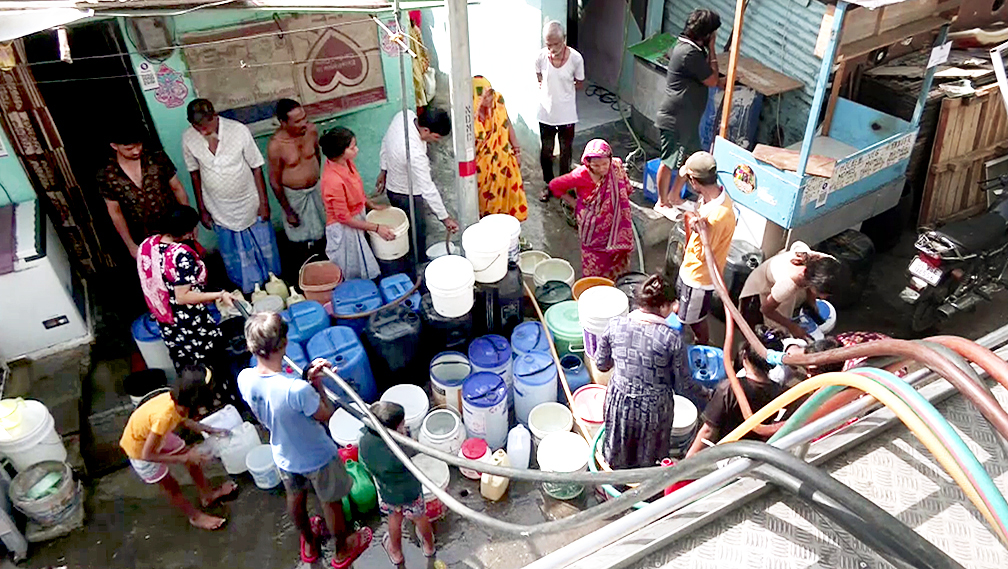NEW DELHI: The Delhi Jal Board reported an acute water shortage, supplying 969 million gallons per day, falling short by 321 MGD. The daily requirement is 1,290 MGD.
Delhi is facing a severe water crisis amidst an acute heat wave, with temperatures soaring above 50 degrees Celsius, causing critical water scarcity across the capital. Residents are enduring long waits for water tankers.
Residents of Geeta Colony in East Delhi have expressed concerns over inadequate government water supply, receiving only half of what is needed. Consequently, many depend on water tankers. North and south-west Delhi, including Mehrauli and Chattarpur, are also significantly affected.
Jatin, a cab driver from Sangam Vihar, told The Sunday Guardian that since last week, “we have been facing water scarcity. We hardly receive water once a day with marginal flow; eventually, we have to depend on the water tankers.”
Ramandeep from Shakarpur in East Delhi claims, “The water is black and smelly, like it’s being supplied directly from the sewer line.” He added that the water is so bad that it can’t be used for drinking, storing, or other purposes.
Riyaz Khan from Geeta Colony said, “There are a lot of problems regarding water in this area. We get only one tanker for the entire area. The tanker water is used for drinking and cooking purposes. Sometimes, we don’t even get the tanker and are forced to buy bottled water.”
Vishal, a resident of South Delhi, told The Sunday Guardian that in his locality, the water flow has been so low that it takes 15 minutes to fill a bucket, and despite several complaints, nothing has been done. He added, “The condition is so bad that I have to buy a water jar for drinking.”
The Delhi Jal Board (DJB) reported an acute water shortage, currently supplying 969 million gallons per day (MGD), falling short by 321 MGD. The daily requirement is 1,290 MGD. However, earlier this week, Delhi Water Minister Atishi Singh introduced a new plan to prevent water wastage.
The Delhi government directed the DJB to impose a Rs 2,000 fine for water wastage. Water Minister Atishi Marlena instructed the DJB’s CEO to deploy 200 teams across the city starting May 30 to identify and penalise anyone found wasting water. The fine will be imposed for washing cars with pipes, overflowing water tanks, and using domestic water for construction and commercial purposes.
She also announced that the government would rationalise water supply in different parts of the capital. “To address the problem of water scarcity, we have taken measures such as reducing water supply from twice a day to once a day in many areas. The saved water will be rationed and supplied to water-deficient areas where the supply lasts only 15 to 20 minutes a day.”
Marlena further alleged that the Haryana government was not releasing Delhi’s water share, causing acute water scarcity. “Haryana has not released Delhi’s share of water since May 1. The Delhi government may approach the Supreme Court if the supply of Yamuna water to the city does not improve in the coming days.”
Meanwhile, Delhi BJP president Virendra Sachdeva criticised the Delhi government for not taking timely action to address the water shortage. Sachdeva claimed that the government was aware of the upcoming heat wave and potential water shortage since April but failed to take concrete steps to mitigate the crisis. He accused the government and private tanker mafia of exploiting the situation at the public’s expense. He added that the Kejriwal-led Aam Aadmi Party was preoccupied with election preparations without concern for the people.
The national capital relies on neighbouring states for about 90% of its drinking water. The DJB sources raw water from four sources: 389 MGD from the Yamuna River, 253 MGD from the Ganga, 221 MGD from the Ravi-Beas River, and 90 MGD from groundwater. After treatment, the total water amounts to 953 MGD, falling short of the city’s estimated demand of 1,380 MGD. However, DJB’s ‘Summer Action Plan 2024’ aims to achieve about 1,000 MGD of potable water during the summer by optimising all resources.

